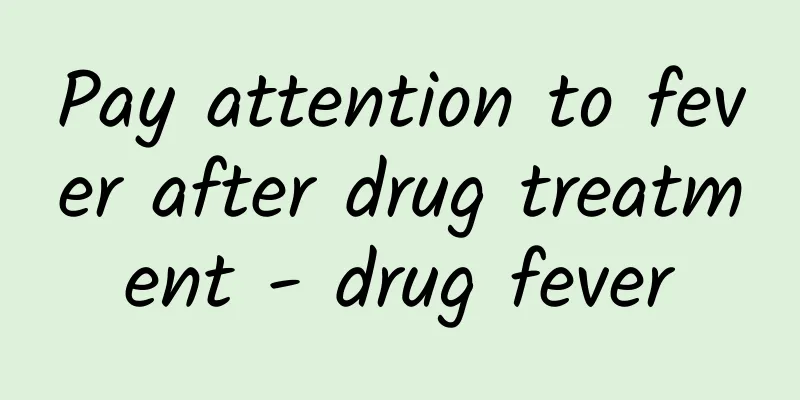Pay attention to fever after drug treatment - drug fever

|
Fever, also known as "fever", is a symptom that we can see all the time in our daily life. Maybe after taking a shower, you don't blow dry your hair, and you have a fever the next day. In this case, most people will choose to take medicine to relieve it. But did you know that some people can also cause fever after taking medicine? Recently, Aunt Li had a "fever" due to infection and used the antibiotic amoxicillin, but unexpectedly, the previous fever symptoms did not ease and continued. Amoxicillin is an antibiotic. It should be able to treat the infection after taking it, and then the fever will disappear, so what is going on? It turns out that Aunt Li may have caused drug fever due to taking antibiotics, so what is drug fever? How to prevent it? Let the pharmacist take you to understand the "true face" of drug fever. First, the pharmacist will introduce to you what drug fever is: Drug fever is a common drug-induced disease, which is a direct or indirect reaction to a patient's fever caused by the use of one or more drugs. The body temperature returns to normal after the drug is stopped.[1] Many people who have drug fever think that the dosage of the drug they take is not enough, and that the previous disease has not been cured, which leads to persistent fever. Therefore, they increase the dosage of drugs. Doing so is not only not conducive to the cure of the disease, but may also cause adverse drug reactions and cause damage to the body! In order to avoid this situation, it is very necessary to understand drug fever. Next, the pharmacist will show you the specific manifestations of drug fever [2]: 1. The first time you take the medicine, the effect is delayed, and fever may not appear until 7-10 days later. However, when you take it again, fever may appear within a short period of time, and the fever may be higher (possibly higher than 39°C), but the patient is generally in good spirits. 2. Patients with drug fever may also experience chills, muscle aches, and drug rash in addition to fever. 3. Normally, if you stop taking the medication that causes the fever, your body temperature will gradually return to normal even if you don't take other cooling methods. After all this, you must be asking, what drugs are more likely to cause drug fever? In addition to the antibiotics mentioned above (such as amoxicillin), there are other drugs that are more likely to cause drug fever: 1. Antihistamines, also known as anti-allergic drugs, such as chlorpheniramine maleate (Chlorpheniramine), diphenhydramine, loratadine (Claritin), etc. 2. Sulfonamides, the most common of which is trimethoprim-sulfamethoxazole (Vantong) 3. Anti-tuberculosis drugs, such as isoniazid, streptomycin, etc. 4. Non-steroidal anti-inflammatory drugs, such as aspirin (Bay Aspirin), acetaminophen (Baifuning), etc. The pharmacist would like to remind you that the antihistamines and nonsteroidal anti-inflammatory drugs in the above drugs are used to treat allergies and fever. In theory, they help the body lower its body temperature to normal, but they may also cause fever, which is called "paradoxical effect of drugs". If you take these drugs when you have a fever or allergy, and your body temperature is still greater than 37.5℃ after 1-2 days of use, it is likely caused by the drugs. You need to be vigilant and do not increase the dosage without authorization. You should seek medical attention in time. So how can we prevent drug fever? Don’t worry, Tiantan Pharmacist has come up with a few strategies for you: 1. Take the medicine strictly according to the doctor's orders. If you feel that you have a fever and it has lasted for several days, you should seek treatment from a doctor immediately, but do not stop taking the medicine without authorization. 2. Patients with allergic constitutions should be extra careful when using the above drugs. It is recommended to measure their body temperature regularly during medication. If unexplained fever occurs, or the existing fever worsens, they should be alert to drug fever and consult a doctor in time. 3. Store the medicine properly, avoid leaving it unused after opening the medicine package, and avoid exposing the medicine to sunlight, which may cause contamination and deterioration of the medicine, and thus cause fever. Drug fever itself is difficult to diagnose and there are no diagnostic standards. If you have a fever and suspect it is caused by taking medication, you should seek medical attention immediately instead of taking medication to lower your body temperature. This is not conducive to the doctor's diagnosis or the subsequent use of medication. Finally, the pharmacist reminds you: 1. Fever caused by drugs is usually not very serious and there is no need to worry too much, but it still needs to be taken seriously so as not to affect normal drug treatment and avoid possible drug damage. 2. In most cases, drug fever can be relieved after stopping the medication. However, since each drug has its own therapeutic purpose, if you stop the medication without authorization, it may aggravate the disease being treated. Therefore, you must never stop the medication without authorization. If you suspect that you may have a fever caused by the medication, you must go to your attending physician for confirmation before making any adjustments. 3. Check the shelf life of the medicine regularly. The opened medicine should be properly stored in a cool, dark and clean place to avoid fever caused by drug contamination. Conclusion: This is the time of autumn when the weather is clear and cool, but if you use medicines and get "unknown fever", it will be uncomfortable, so you should use medicines reasonably to avoid the occurrence of drug fever. But if drug fever does occur, you don't have to worry too much. Timely medical treatment and consultation with pharmacists will help you get through the difficulties! 【References】 [1]. Li Fei, Liao Yufang, Yan Jianhua. Clinical analysis of a case of piperacillin-tazobactam-induced drug fever and anti-infection treatment adjustment participated by clinical pharmacists [J]. China Pharmaceutical Industry, 2020, 29(2): 48-51. [2]. Zhu Yunhe, Shen Xueyuan, Chen Li, Xiang Xiaoyong. A brief discussion on the pathogenesis and clinical diagnosis and treatment of drug fever[J]. China Medical Guide, 2011, 9(18): 226-227. |
<<: Beware of the precursors of drug-induced rhabdomyolysis: flu-like symptoms
>>: Which province is Guilin located in? Why is Guilin called Guilin?
Recommend
What should be paid attention to during hysteroscopic removal of uterine septum
We already know that once a woman has problems wi...
What are the benefits of canned pears? How to store canned pears
Canned pears are rich in pectin, which can help t...
Why did my mother become shorter?
One day, I suddenly found that my mother, who use...
What should I do if my menstruation doesn't come due to uterine cold?
This is the impact that uterine cold can have on ...
Is artificial white sugar a scourge to mankind? The real harm of white sugar is only these two
Real points: "Artificial white sugar" i...
Reasons for delayed menstruation
There are many reasons for scanty and delayed men...
Six months pregnant left rib pain
We all know that when a woman is six months pregn...
Why are the small bumps on the vulva itching?
If female friends do not pay attention to the hyg...
Pain when bending fingers during late pregnancy
After pregnancy, as the fetus grows and develops ...
Rope skipping is a science. How to do it scientifically? Let's see the correct demonstration.
Rope skipping is a good and cheap option for losi...
What are the benefits of eating deer antlers for women?
Many people know that deer antler slices can stre...
What color of skirting is good for white doors? How to choose the color of skirting for white doors
We all know that many people install skirting in ...
What are the risks of miscarriage at six months?
Abortion is mainly divided into two types: artifi...
Symptoms of lumbar muscle strain in women
Hello everyone, today we are going to talk about ...
What ingredients are needed to make fruit salad? How to make fruit salad
Fruit salad is a dish consisting of various fruit...









